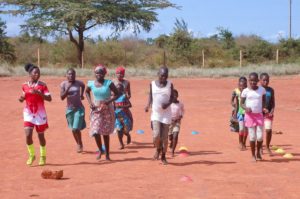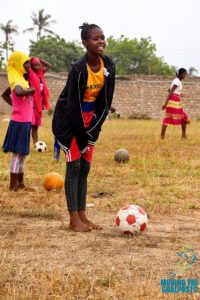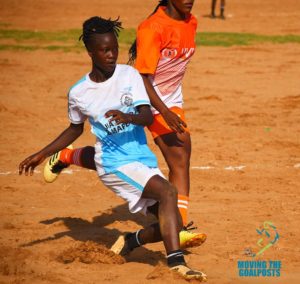“To create lasting change, you have to empower communities” – How Moving the Goalposts is helping women in Kenya

Moving the Goalposts started as a small organisation attempting to help 100 Kenyan girls by getting them playing football.
Fast-forward to 2022 and that number has risen to 9,000.
Dorcas Amakobe is the executive director of the group, and from her base in Kenya she explained how they are helping Kenyan women.
“It was first created by a BBC correspondent; she came to Kenya and didn’t see many girls playing sport because their responsibilities were in the household” she says.
Household responsibilities will often mean things like childcare, even at the ages of 12 and 13.
“This made her wish that girls were more capable of having discussions around gender equality and exploring their brains beyond the household” she says.
What Moving the Goalposts do
The approach to expand these young girls’ worldviews has been multifaceted. First of all, Moving the Goalposts seeks to get them playing football.
Each community where the group work has multiple sides which meet up once a week to play.
“You have to remember these are not professionals!” Amakobe jokes.

“You will see girls running the wrong way, missing the ball, and just sitting down. But they’re just happy to be there, on the pitch” she says.
One of the most important aspects of their work is to get as many female leaders in as possible, to prove to the girls that it can be done.
“We always promote women leadership; our coaches and referees are all women. This helps us to really communicate our message of women empowerment” she says.
The second aspect of the sessions comes after the football when one of these leaders will sit a group down and teach them about life skills.
“They learn about sexual violence and their own rights, like their rights to education and economic empowerment.
“We also have a reproductive health curriculum. It takes nine months, and they learn about their bodies, their relationships and sexually transmitted diseases” she says.
These lessons often encourage the girls to speak out about their own experiences as well.
“It is an important achievement just to be able to stand in front of people and speak, it shows confidence” she says.
Succesful stories
These small but important achievements have been coupled with large-scale successes for the organisation.
Amakobe beams with pride when she speaks about their best women’s team – Moving the Goalposts United – who are currently playing in the Kenyan Premier League.
There have been issues with Kenyan domestic football after it was banned by FIFA for government interference, but the league is still running.

“Our girls are still playing. They’re currently second in the league and are playing very good football” she says.
She also mentions a girl who once was a part of the organisation and has gone on to become a successful professional footballer.
“She won the golden boot! 18 goals in 21 matches. She’s a great example of the changes these things can have on young women” she says.
Pushback against Moving the Goalposts
Despite the plethora of successes though, starting an organisation like this in Kenya has come with some pushback.
“There are lots of myths and misconceptions here about women playing sports” Amakobe explains.
“It can sometimes be regarded as something that makes women more masculine or gain more muscle.”
This issue is a double-edged sword as it can affect women’s desire to take part for fear of judgement, but it can also affect parent’s willingness to let their children take part.
“We have invested a lot of resources and time into also training parents to understand why playing sport is important” she says.

This old school of thought that women playing sport is bad, and that their place is in the household, is still commonplace in Kenya.
Teaching women about sexual health and their rights can also still be an issue, but Amakobe is keen to stress that it is improving with time.
“We’re experiencing it less, but it always comes up.
“I think it’s getting less and less now, and we are running our programme much smoother as time goes on” she says.
The issue of gender equality in sport is of course something that is a worldwide problem. And looking to the future it is something Amakobe hopes will end one day.
“We hope that one day women participating in sport is just seen as normal, not something that you have to put in effort to achieve.
“Women should be able to wake up and decide they want to try any sport they like” she says.
With the help of organisations like Moving the Goalposts, this dream will hopefully soon become a reality.